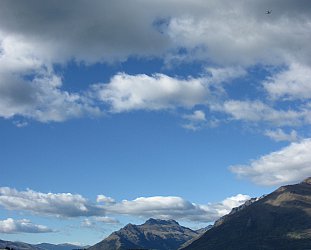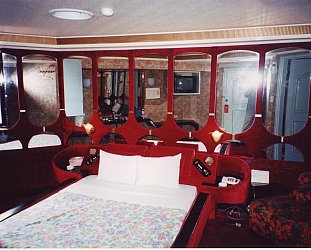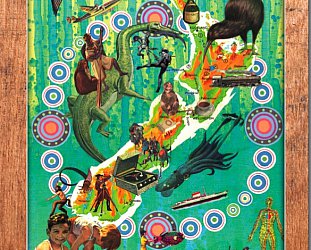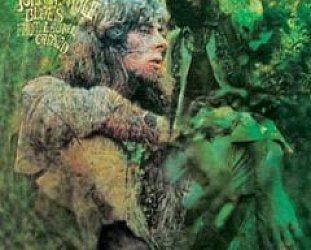Graham Reid | | 16 min read

Beyond the wingtip is a clear blue sky, exactly the
same kind out of which tragedy arrived a year ago.
It is September 11 and
I'm flying into New York, America's capital of brashness but which now has a
hole in its heart.
Security today has been tight as expected in a country
on "orange alert" (one down from "red alert") but as I have hopped from Los
Angeles to Seattle then Chicago these past three days the flights have all been
full. In the past days I have seen About a Boy three times with the sound off,
flown over glorious patchwork fields of brown and green, soared over thick
forests which have glowed in the autumn light, and looked down on cloud-filled
canyons. America the beautiful.
But on television and in newspapers there
has been talk of war, "regime change" has entered the common tongue, and as the
first anniversary of September 11 approached there was a palpable tension and
uncertainty. My friend Karen in Chicago and her boss Dave are both going to work
from home today rather than go into the office.
Yet flying is as American
as a side order of fries and "you're welcome", and so the planes, as expected,
have been full.
But today, the anniversary of the iconic "9/11", is very
different.
At Chicago's O'Hare International - usually the busiest
airport in the world - the polite young man waving the electronic wand over me
says, "It looks like midnight in here."
He's right. At 7.30am the
concourse is deserted.
The woman at the United Airlines counter says, "If
you want a window or aisle seat that's fine, we've got a whole plane for you. In
fact, pick a row."
Of course, logic tells us this is probably the safest
day of the year to fly. We undergo two thorough security checks - "and now if
you could take off your shoes sir, I'd like to check them and the bottoms of
your feet" - and everyone seems to be watching each other. I feel sorry for that
Muslim family on their way to Los Angeles.
There is the presumption that
terrorists will strike today. Yet by its very nature terrorism is unpredictable.
Why September 11, 2001? Why not?
But a lot of people aren't buying the
safety argument and have put off flying for another day.
Minutes before
take-off the security and airlines staff outnumber passengers by two-to-one.
There are fewer than two dozen of us flying to New York this morning.
The
guy in the red shirt opposite puts down his Dean Koontz novel to cross himself
as we taxi to the runway. Those who have arrived in pairs fall conspicuously
silent.
Our captain comes on the intercom just before we race down the
runway to tell us because of the significance of this day there are security
restrictions in place.
We can't leave our seats in the half hour after
take-off or the half hour before landing.
"If you get up at that time,"
he says, "Well, we're gonna take that pretty seriously. So sit back and relax
and take a good look out the window at our beautiful country."
We lift
off. Chicago's Sears Tower - the second highest building in the world after the
Petronas towers - pierces the skyline to our right, the broad expanse of Lake
Michigan ahead.
Somewhere over Michigan our smiling steward gives us
breakfast boxes. It all seems alarmingly normal - but it's not. One of the crew
comes over the intercom to remind us of this tragic day in American history and
how "we got through that day and the year that followed, and we can get through
these days, by supporting each other".
We are invited to reflect on the
day and the lives lost, then the steward returns, offering more
coffee.
It was on just such an otherwise ordinary day, on ordinary
commuter flights like these, that tragedy came out of a clear blue sky. For even
the most cynical, it is a chilling thought.
We approach New York and the
pilot dips the left wing towards that dusty hole in the ground - Ground Zero -
as a mark of respect. Below us are Central Park, the beautiful Chrysler Building
glinting in the morning sun, the Statue of Liberty ... Ninety uneventful minutes
after leaving Chicago the guy across the aisle is crossing himself again and we
have taxied up to the walk bridge at LaGuardia.
"Welcome to the great
city of New York," says our captain. "Sixteen minutes early."
In the city the wind is whipping up small whirlwinds of paper and dirt on the corners, the humidity is rising, and there's a garbage truck blocking the road.
David, our bus driver, who is clearly
having a bad day, is starting to boil. "Take your time why doncha?" he yells at
the two rubbish collectors, who continue to do exactly that.
This is
midtown Manhattan and it's September 11, so add to the gridlock on this hot,
windy day, police cordons, commemorative services and the occasional motorcade
taking dignitaries to Ground Zero. David's day is getting no better, and we are
getting nowhere.
"Construction city," he snarls to no one in particular
as we are halted by yet another line of cones around a building site.
There's something in the way he says "Bush and Lexington" which prompts
a large woman to ask, "Did you grow up in Boston?"
"Yeah, ain't that a
pretty thought right now?" he shoots back.
"Oh, I don't know," says a
poised, middle-aged woman. "It would take a lot to get me pissed today. There
are a lot of people not around to complain."
This is talkative New York
conducting its own internal dialogue, and September 11 is the
backdrop.
At Union Square there are children's posters, drawings and
commemorative poems. Fire stations all over the city - and especially those
downtown which lost crew members - have become sites of honour and
acknowledgement. Flags hang off buildings and car aerials and bedeck chests and
breasts everywhere. Patriotism is worn literally as a heart on a sleeve.
But New York also goes about its business as usual. Traffic banks up
along Broadway and people queue for theatre tickets at Times Square. Chinatown
puts its vegetables out on the street, tourists toting cameras take pictures of
the Empire State Building and the Woolworth Building, and around the Bowery, men
load kitchen appliances into trucks as they do most days.
At Blarney's
Bar on Murray St just two blocks from Ground Zero - where President George W.
Bush later spends an hour talking to families of those killed a year ago - two
English bobbies who have been at the site in the morning for the roll call of
victims' names, sink their pints and chat with regulars.
Above the bar
the television screens constant September 11 coverage, including interviews with
survivors or family members, taking us live to Ground Zero or to see Airforce
One land at JFK.
There is also the celebrity parade - more modest than
anticipated but their agents have doubtless told them this was the day for
ordinary folk. Local hero Billy Joel, who wrote New York State of Mind, looks
the worse for wear after his recent hospitalisation for unspecified problems.
Most in the bar don't recognise him until he sits at the piano.
"Hey,
dat's the piano man," bellows one bowling-ball shaped patron. There are hoots of
laughter.
Danny, an Australian in the city for a day, went up the Empire
State Building this morning and proudly shows his ticket stamped with the "9-11"
date. "That's something to show around, I reckon."
Yes, this is a
special day and everyone knows it. It is also a day of strange conjunctions. On
a downtown corner opposite a halal meat store is a large, handwritten poster in
a window. It reads "Allah may forgive you but we don't."
At LaGuardia
airport impossibly young soldiers carry automatic weapons half their size. In
the glistening corridor of pale formica and glass they are wearing highly
visible, green-dappled camouflage gear.
And security is visible
everywhere on this nervous day, no more so than at Ground Zero, where people
look anxiously to the sky every time an aircraft goes over on its way to
LaGuardia or JFK.
Dozens of New York's finest are sipping coffee,
explaining patiently to persistent people why they can't go on to the viewing
platform, or just looking plain bored. It's a big day and also a long one. The
presidential visit is still hours away.
Ground Zero is ringed by fences
covered in messages and memorabilia, television crews and thousands of people
carrying video equipment and point-and-shoot cameras.
There is a long
queue to get into St Paul's Church on Vesey St right by the site, which is now
simply a huge hole whipped by a vicious wind. Dust coils into the air and is
swept into the faces of those around the perimeter. Many people here are dabbing
their eyes, for whatever reason.
Ground Zero is off-limits to all but the
families but the streets around are crowded with those who have come out of
curiosity or to pay their respects. This being New York, there are also the
hawkers and gawkers - and the usual dealers in apocalyptic
literature.
According to one giveaway magazine there are no lengths to
which the Pope, the United Nations and/or the United States won't go to create a
new world order. A man from the American Bible Society is giving away CDs of the
23rd Psalm "dedicated to the children who lost parents and loved ones in the
9-11 tragedy".
These are the last days, according to one sweaty
evangelist. A man walks by carrying a wooden cross, a girl in a tiny tank-top is
giving away Bible prophecy brochures. It's a circus of the crazy and the
Christian extremists.
There are a dozen languages being spoken and people
have been drawn here despite the country being on an "orange alert" security
rating.
Given the potential for such a crowd becoming a target in these
nervous times, this is like people going to the beach to watch the tidal wave
come in. But they are all here: Rastafarians rub alongside orthodox Jews and
overweight guys in faded football T-shirts.
And the messages on the
T-shirts tell their own stories of patriotism: "We Remember", "God Bless
America", "One Year Later the Building Continues", "America is full", "Harley
Davidson" ... Caps with "NYPD" and "FDNY" are common. You don't see too many of
Donna Karan's "DKNY" these days.
"You know who I miss," says Ronnie from
New Jersey, a blowsy woman in a stars'n'stripes shirt and displaying a sense of
humour which is rare on this day.
"It's the Krishnas. Remember when they
used to be all over the streets and in the airports? I kinda miss them, they
were fun."
There is scattered applause for passing fire trucks, symbols
of the heroism. And many New Yorkers - many Americans in general, perhaps - are
searching for symbols and icons to encapsulate and make manageable the events of
a year ago.
The current issue of Newsweek reduced the narrative to four
people, two politicians, one soldier and Lisa Beamer, who has become the most
readily identifiable face of the tragedy.
It was her husband Todd who
took on the hijackers of Flight 93 and uttered the words "Let's roll", which
have also become a shorthand for bravery. Her memoir - Let's Roll, of course -
is this week's top non-fiction best-seller. It is one of eight September 11
books among the New York Times' 20 best-sellers. Most of the New York Times'
book review section is taken up with reviews of new books that are September
11-related.
On this day, television has been preoccupied with the
tragedy, but talk shows that search for meaning usually end up bringing out more
survivors to hear their stories all over again. Newspapers search for that one
image that encapsulates ... something.
But this is an event of such
knotty human emotions and political reaction that it is almost unmanageable.
Easier to hail the heroes and identify by labelling: The Day Before, The Day
After, The Circle of Hope, Ground Zero, A Survivor's Story. These labels are
everywhere, dividing the event into small pieces.
The iconic "9-11" -
those verticals translating easily into the likeness of the Twin Towers on
T-shirts and posters - has become a simple code for complex matters. But while
it looks reductive it is useful: it allows multiple emotions to co-exist.
It is open, not closed like so much of the coverage, which would hail as
"heroes" ordinary people who had done little more than be in the wrong place at
the wrong time. It is a redefining of the word that seems churlish to question,
given the immensity of the tragedy, and certainly this isn't a day for
dissenting voices. Some of those T-shirt messages were pretty angry.
But
if many are looking for meaning they are also looking inward rather than
outward. It is noticeable that when tourists - outsiders, as it were - speak
about the events and subsequent reactions they see the world
differently.
The young German couple at Pomodoro Restaurant - "home of
the vodka pie" - become quiet when the NYC couple they share the table with
speak about invading Iraq "to get rid of that Saddam Hussein". The talk turns to
neutral subjects like the Chevy Chase comedy European Vacation.
By
nightfall the joggers and powerwalkers are on the streets as usual, people spill
out of bars, Friends is on television, and for many it's another ordinary night
in this extraordinary city.
The wind has finally died down. Gusts of more
than 80km/h mean the cancellation of the concert of remembrance in New Jersey's
Liberty State Park and tear apart a huge flag above Ground Zero, an unfortunate
symbol on this day which many see as a time of hope. "I guess that flag-maker
just went out of business," says Helena from the Bronx.
The President,
who didn't speak publicly during his visit to Ground Zero, is to address the
nation at 9pm. As he appears on the screen above our heads in a SoHo restaurant,
Andrew from the Upper West Side but in downtown for swing dance lessons, says,
"I'm more worried about him than I am about anybody else.
"It's strange
how most people in Manhattan, where this happened, are less sure about what to
do than others. Out there in Wisconsin it's a simple issue, here it's much more
complex."
He mentions his local pizza place. It is run by Palestinians
and was called the Cheesy Pizza Place until September 11. Now it's the Love New
York Pizza Place. "They're still cheesy pizzas," he laughs.
He's reading
The Onion, the satirical magazine which this week asks the question, "Who will
bring closure to a grieving nation?" over the logos of the various television
networks, including the rock video channel MTV.
Maybe of them all it
could be the rock channel, especially for the young whose world became much more
uncertain this time last year. In a bar near midnight, Suzie - whose real name
is Miyki, she tells me after another vodka and tonic - is "just, like, sooo sick
of my boyfriend's buddies hitting on me".
Then out of nowhere she says,
"I mean it's like ... you know this thing today. It was horrible and all that
but, you know, life goes on, I guess. We should just get over it."
On the
screen a woman at a commemorative concert is singing with contorted and
overwrought facial expressions. The subtitles read "we were so young, we were so
blessed". In the bar they're playing Bruce Springsteen's Miss You from his new,
September 11-influenced, album.
Elsewhere classic hits radio plays Let It
Be and Marmalade's Reflections of My Life - and without realising the irony,
American Woman, an anti-Vietnam song by Canada's Guess Who.
If an
invasion of Iraq takes place there will doubtless be other rock'n'roll voices of
dissent. The new album by Seattle's Pearl Jam, a questioning and penetrating
collection, is just weeks from release. Its reception in the current climate
will be interesting.
This, then, is the paradox of September 11. It was a
violent tear in American history but some say as a "historic day" it will fade
and that, unlike the attack on Pearl Harbour, it will lead to nothing lasting.
Sure, the invasion of Afghanistan took place, but that is remote and
even now barely registers in the media. The almost inevitable invasion of Iraq
to affect "regime change" could be much the same.
Fighting terror or the
faceless perpetrators of it isn't as clear-cut as World War II. Or maybe as
winnable. "There are a few doubts about this Iraq thing," says a guy in a
bookstore.
But at an individual level - and there are many thousands of
people in this city directly affected - September 11 will never go away,
certainly not in New York.
As an unidentified survivor of the World Trade
Centre tragedy, who might have been giving voice to the sentiments of many, told
ABC news, "Honestly I want to forget it. But I can't."
This is the combination of two articles which appeared in the New Zealand Herald www.nzherald.co.nz







post a comment